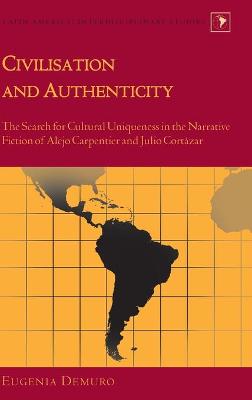Latin America: Interdisciplinary Studies
1 primary work • 2 total works
Book 25
The question "What is Latin America?" has been at the heart of writing from and about Latin America from Columbus' conquest to present-day discussions and nationalising projects. What this belies is the inherent question "What is Latin America compared to Europe?" This book lays bare the underlying logic of a Latin Americanist discourse through some of the continent's most influential thinkers, including Domingo Faustino Sarmiento, Jose Marti, Jose Enrique Rodo, Jose Vasconcelos, Fernando Ortiz, Roberto Fernandez Retamar, Nestor Garcia Canclini, and Walter Mignolo.
Civilisation and Authenticity presents case studies of two of Latin America's most renowned and representative twentieth-century writers, the Cuban Alejo Carpentier and the Argentine Julio Cortazar and reveals how desire to define Latin America is entwined throughout their groundbreaking experimental novels, focusing on Carpentier's Los pasos perdidos (1953) and Cortazar's Rayuela (1963). New research into the poetics of these authors and jargon-free analyses of their fiction outline how the Latin Americanist discourse persists in both writers' representations of the Latin American landscape and people as either Europe's "authentic" and marvelous "Other", or its "civilised" and modern counterpart.
Civilisation and Authenticity presents new research for experts on Carpentier and Cortazar and will be indispensable to students of Latin American literature. Its delineation of the Latin Americanist discourse makes it an ideal reference for anybody studying Latin American cultural studies.
Civilisation and Authenticity presents case studies of two of Latin America's most renowned and representative twentieth-century writers, the Cuban Alejo Carpentier and the Argentine Julio Cortazar and reveals how desire to define Latin America is entwined throughout their groundbreaking experimental novels, focusing on Carpentier's Los pasos perdidos (1953) and Cortazar's Rayuela (1963). New research into the poetics of these authors and jargon-free analyses of their fiction outline how the Latin Americanist discourse persists in both writers' representations of the Latin American landscape and people as either Europe's "authentic" and marvelous "Other", or its "civilised" and modern counterpart.
Civilisation and Authenticity presents new research for experts on Carpentier and Cortazar and will be indispensable to students of Latin American literature. Its delineation of the Latin Americanist discourse makes it an ideal reference for anybody studying Latin American cultural studies.

